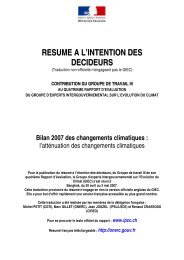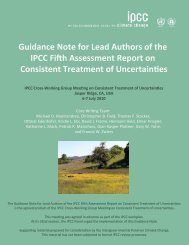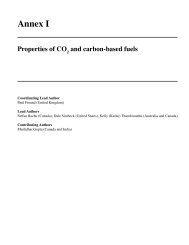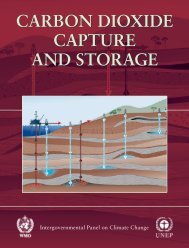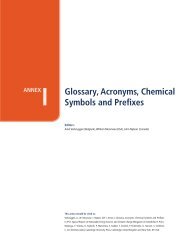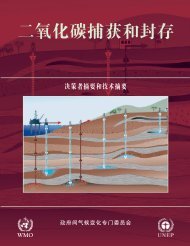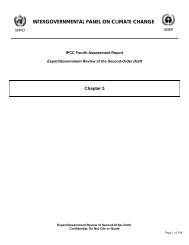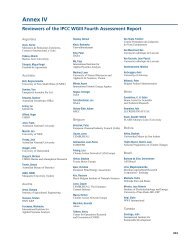SODBatch A&B SPM Comments co-chair response final ... - ipcc-wg3
SODBatch A&B SPM Comments co-chair response final ... - ipcc-wg3
SODBatch A&B SPM Comments co-chair response final ... - ipcc-wg3
You also want an ePaper? Increase the reach of your titles
YUMPU automatically turns print PDFs into web optimized ePapers that Google loves.
Chapter-<br />
Comment<br />
<strong>SPM</strong>-<br />
116<br />
<strong>SPM</strong>-<br />
117<br />
<strong>SPM</strong>-<br />
118<br />
<strong>SPM</strong>-<br />
119<br />
para<br />
Batch<br />
From Page<br />
From Line<br />
To Page<br />
To line<br />
<strong>Comments</strong><br />
IPCC WGIII Fourth Assessment Report, Se<strong>co</strong>nd Order Draft<br />
7 B 8 3 8 4 The statement in bold is rather trivial as a summary for this<br />
paragraph: make this more specific. What is the range of <strong>co</strong>sts (as<br />
% of GDP) for various stabilisation levels. Then the sensitivities<br />
can be explained in non-bold text.<br />
(Government of European Community / European Commission)<br />
7 B 8 3 8 8 The <strong>SPM</strong> should include a discussion clarifying the important<br />
modeling assumptions that drive <strong>co</strong>sts. U.S. Government<br />
(Government of U.S. Department of State)<br />
7 B 8 3 8 8 P. 8, lines 3-8 and n 5; and p.11, lines 19-23 and n 9 --- The<br />
stabilization <strong>co</strong>sts indicated in the <strong>SPM</strong> are (highly) suspect<br />
because those <strong>co</strong>sts are assessed against baselines that already<br />
include large reductions in emissions attributable to technological<br />
change, the adoption of which has not been <strong>co</strong>nsidered in the<br />
mitigation <strong>co</strong>st analysis (or has simply been treated as involving<br />
zero <strong>co</strong>st). Moreover, many <strong>co</strong>st estimates are based on models<br />
that assume a carbon-free “backstop” energy technology(ies) that<br />
may (does) not yet exist, a technology that is often identified as<br />
“generic”. The “backstop” technology assumption can substantially<br />
reduce mitigation <strong>co</strong>sts. The <strong>SPM</strong> should include a discussion<br />
clarifying the important modeling assumptions that drive <strong>co</strong>sts.<br />
U.S. Government<br />
(Government of U.S. Department of State)<br />
7 B 8 3 8 4 Is the statement necessarily true for lower levels of participation?<br />
May make it more expensive for those who participate, but total<br />
<strong>co</strong>st may be fixed. Clarify that the <strong>co</strong>sts being referred to are global<br />
totals. Costs in different <strong>co</strong>untries may indeed be lower if the<br />
<strong>co</strong>untries do not participate. U.S. Government<br />
(Government of U.S. Department of State)<br />
Expert Review of Se<strong>co</strong>nd-Order-Draft<br />
Confidential, Do Not Cite or Quote<br />
Response suggested by <strong>co</strong><strong>chair</strong>s<br />
studies to use) and out<strong>co</strong>mes<br />
may change if full joint analysis<br />
is done; also probably a good<br />
idea to present 2030 out<strong>co</strong>mes<br />
together with 2050 in figure 5b<br />
REJ; this is a general summary;<br />
details follow; point on<br />
participation effect to be added<br />
REJ; leave that to chapter/TS,<br />
see also A-563<br />
Identical A-562<br />
TIA; clarify that this is about<br />
global <strong>co</strong>sts; statement is true:<br />
the more <strong>co</strong>untries participate<br />
the lower the global <strong>co</strong>sts; it is<br />
not always true that the <strong>co</strong>st for<br />
those that participate are lower,<br />
because of effects of trade and<br />
Action<br />
for<br />
chapter<br />
Considerations<br />
by the writing<br />
team<br />
(3)<br />
Page 148 of 348




